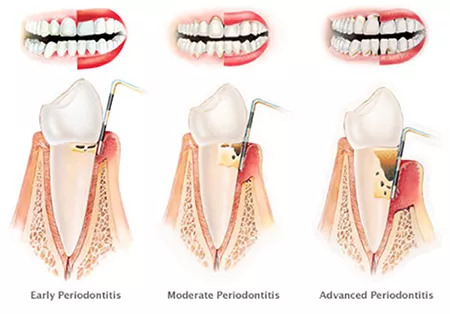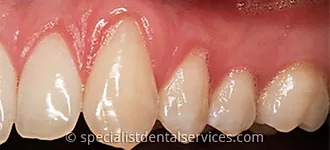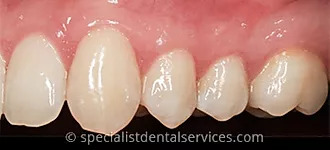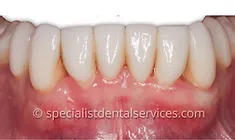There are three types of periodontal disease. This is caused when bacteria, found in plaque, works between the soft tissues (gums) and your tooth. It slowly destroys the underlying bone and damages the roots of your teeth. In time, your gums become more inflamed and ‘puffy’, bleed readily and uncomfortable eating and eventually, if left untreated, could lead to loss of your teeth. The early stages can be treated with non-surgical clinical techniques.

Also known as gum disease, Periodontal disease is a gum infection that damages the soft tissues. If left without treatment, it can destroy the bone that supports your teeth. It mainly results from poor oral hygiene.
The sugars and starches present in our food interact with the bacteria inside the mouth and form a thin layer over the teeth called Plaque. This Plaque if not removed can eventually harden to a point where it becomes Tartar. The Tartar is very difficult to remove and requires the help of professional Dental cleaning services.
The Tartar and Plaque including the bacteria developed under the gum line causes infection and eventually leads to gingivitis - irritation and inflammation of gum tissue around the base of the teeth. If left unchecked, this can cause even more deeper infection, creating more space between the teeth and the gums, and can lead to serious gum disease (Periodontitis). This gum disease is what causes the separation of teeth from your gums.
Here's what makes us best in Periodontics in London. Initially, a record of measurements are taken around each tooth to ascertain the level
of the disease. This is repeated throughout each stage of treatment to continuously check
the progression of the disease. This is called a six-point pocket chart.
Once it is clear which stage of the disease you have, recommendations on the appropriate gum disease treatments
are made and a bespoke treatment plan is given to you. The early stage of treatment may involve oral
hygiene instruction and deep scaling (prophylaxis) and polishing with a Dental Hygienist/Therapist.
Once this phase of treatment is completed, you are reassessed by Our Specialist Periodontist in London to see
if further treatment is necessary.
Root plaining is another form of deep scaling which can be best carried out by the Periodontist.
This treatment is carried out under a local anaesthetic and is usually treated over 2 appointments.
Periodontal Surgery – This is the most invasive treatment and sometimes necessary for moderate and
advanced disease cases. It may also be necessary to add bone grafting and application of medicaments
to the area to help destroy the harmful bacteria and rebuild your lost bone.
It is difficult to give an accurate fee for periodontal treatment as there can be a wide range of treatments required per case. However, a general guide is below:
You will always need regular hygienist and dentist support to maintain a meticulous oral hygiene regime. We are always here to support you as well as your own dentist. Visits between your regular dentist and us are recommended.
Some examples from patients who have undergone successful recession and root coverage surgical procedures:


For more information on Periodontics or to arrange a consultation in London please contact us on 0207 580 4200.
Back to Treatments

"I decided to have soft tissue grafting from the palate and I can honestly say that the results are better than anything I could have expected! I'm absolutely thrilled with the end result and the soft tissue grafts on my lower gums have given me more root coverage than I ever thought possible." "If you need a dental specialist who is exceptionally talented and who is very kind and calm, then I would highly recommend Dr Shakeel"
"I am so thankful to Dr Shakeel and his team and I hope this review helps anyone reading it to feel a bit more confident about contacting SDS for a consultation."
To see more before and afters like this, visit our Smile Gallery.
SMILE GALLERY


ADDRESS: 94 HARLEY STREET, LONDON, W1G 7HX
TEL: 020 7580 4200 | SMILE@SPECIALISTDENTALSERVICES.COM
Fields with (*) are required.
Please contact us via this website or email without disclosing confidential information.


